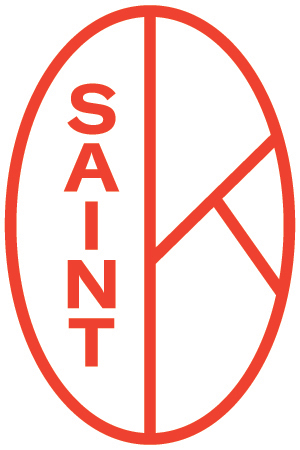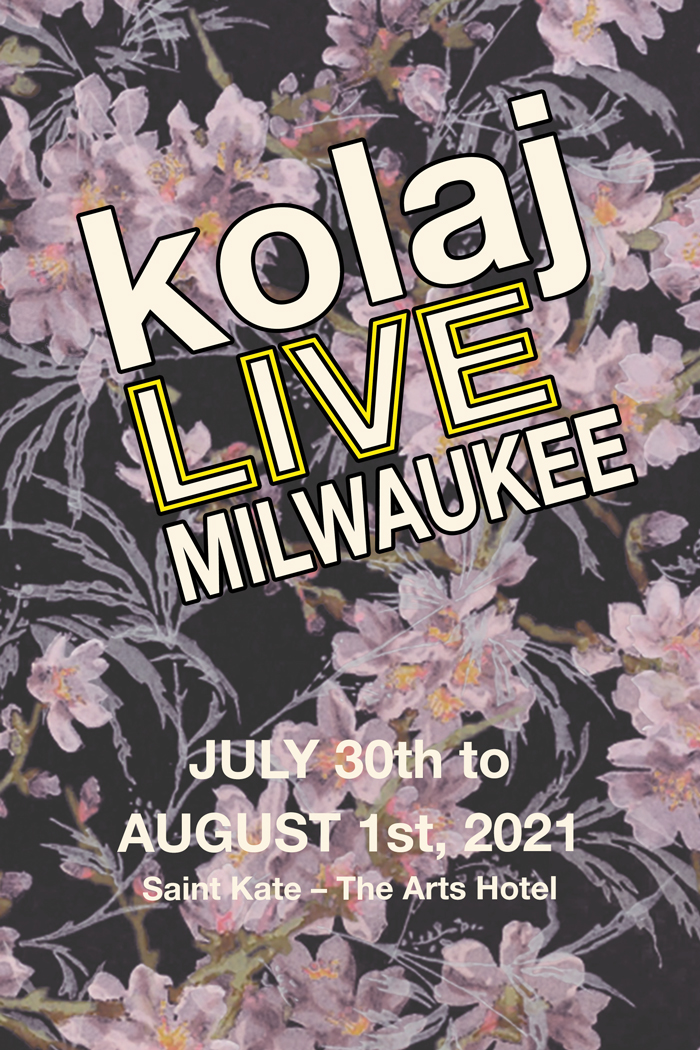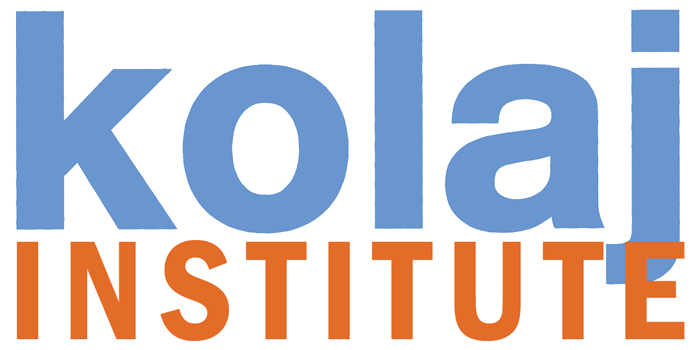
ABOUT | PROGRAMS | PUBLICATIONS | NEWS | SUPPORT
KOLAJ MAGAZINE | ARTIST DIRECTORY | SHOP
PROGRAM | HOST HOTEL | REGISTER
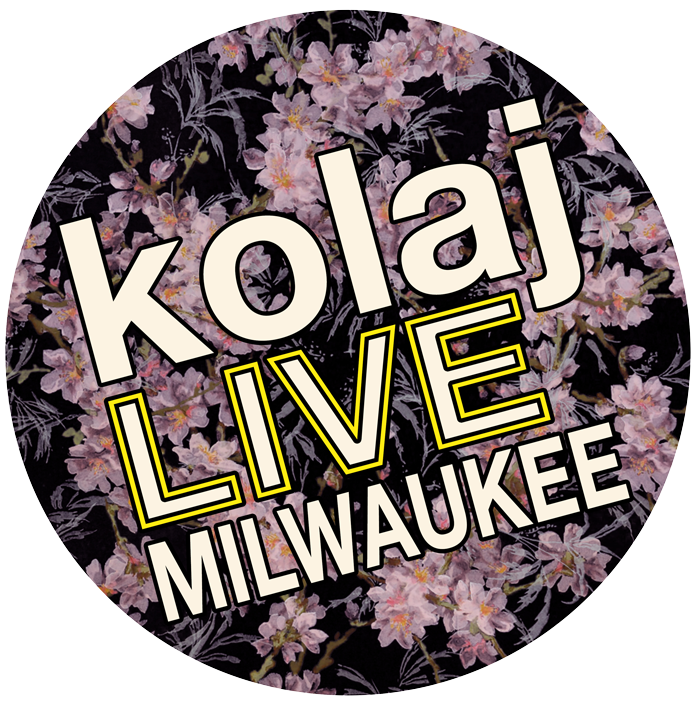 Kolaj LIVE Milwaukee
Kolaj LIVE Milwaukee
Friday, July 30th, 2021 to Sunday, August 1st, 2021
Saint Kate—The Arts Hotel, Milwaukee, Wisconsin
Program Book
The Kolaj LIVE Milwaukee Program Book documents the presentations and projects at the event. In these pages, you will find a schedule and descriptions of sessions, descriptions of evening events and special programs and some helpful information about being at Kolaj LIVE Milwaukee.
Click the cover image to download a PDF version of the Program.
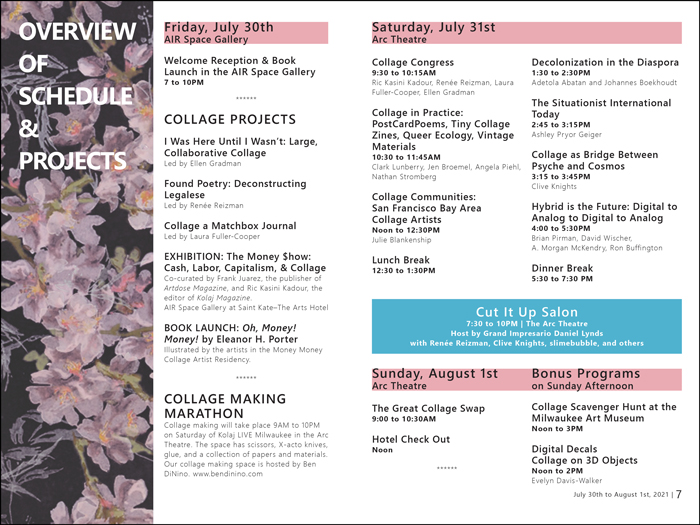
(click to view larger)
PROGRAMS & PROJECTS
COLLAGE PROJECTS
Large, Collaborative Collage: I Was Here Until I Wasn’t
Deconstructing Legalese: Found Poetry
SPECIAL EVENTS
Welcome Reception & Book Launch in the AIR Space Gallery
BONUS PROGRAMS
SYMPOSIUM SESSIONS
Collage in Practice: PostCardPoems, Tiny Collage Zines, Queer Ecology, & Vintage Materials
Collage Communities: San Francisco Bay Area Collage Artists
Decolonization in the Diaspora
The Situationist International Today
Collage as Bridge Between Psyche and Cosmos
Hybrid is the Future: Digital to Analog to Digital to Analog
SPECIAL EVENTS
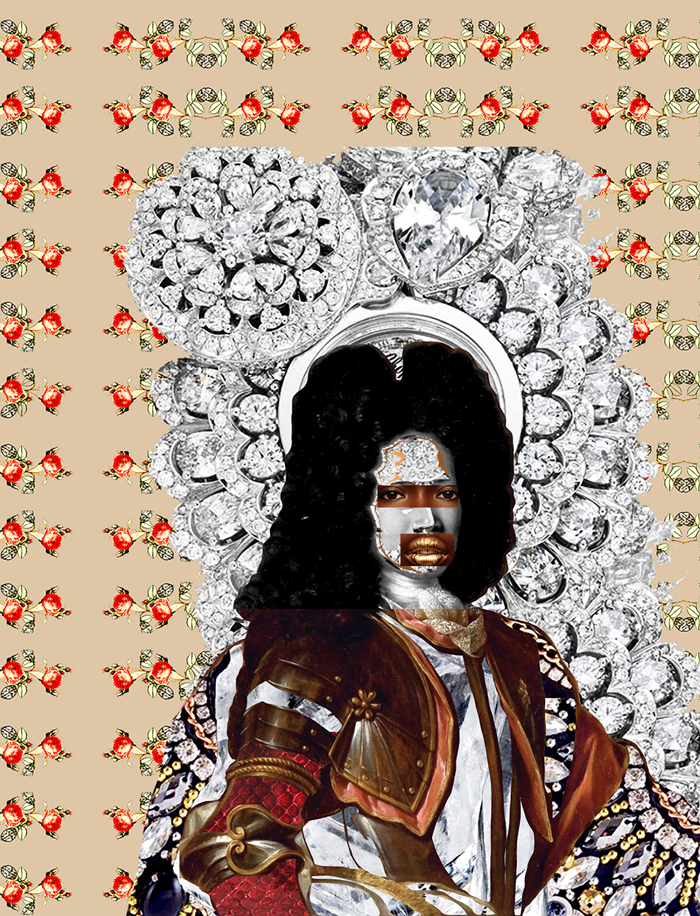
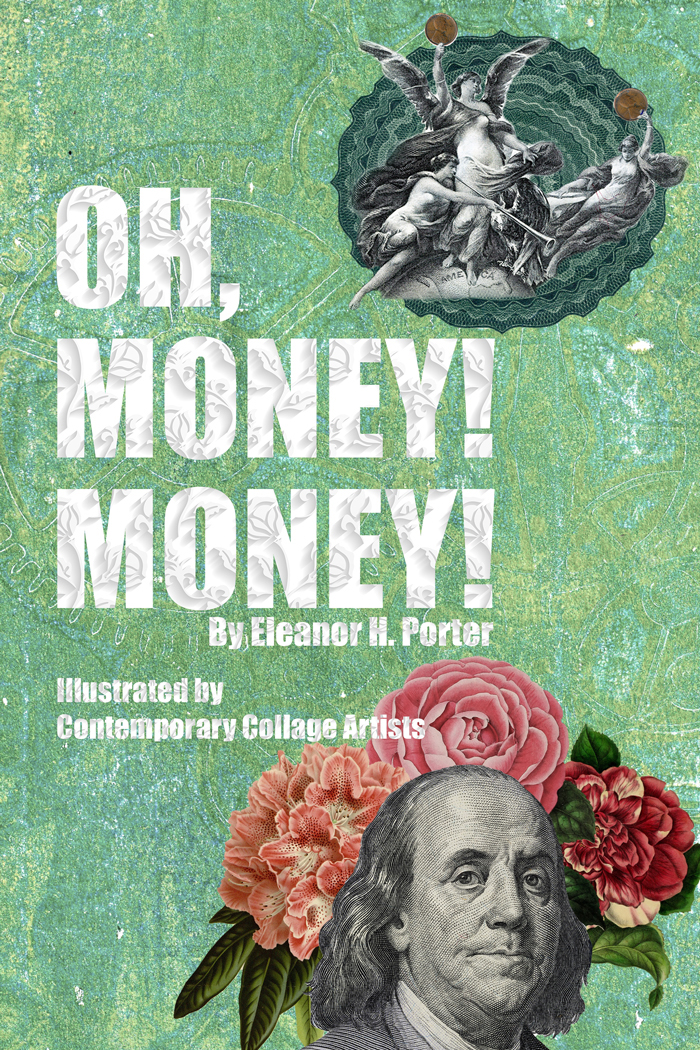
AT KOLAJ LIVE MILWAUKEE
Welcome Reception & Book Launch in the AIR Space Gallery
Friday, July 30, 2021
7 to 10PM
Grab a drink at The Bar and meet us for hors d’oeuvres in the AIR Space Gallery for a welcome reception and book launch in the “The Money $how” exhibition.
Curators Ric Kasini Kadour and Frank Juarez will give a brief talk about the exhibition.
Kolaj Institute will unveil the book, Oh, Money! Money! by Eleanor H. Porter. To illustrate the book, Kolaj Institute organized a residency that brought together ten artists who worked collaboratively to make sixty-three collages that interpret Porter’s novel for a 21st century audience.
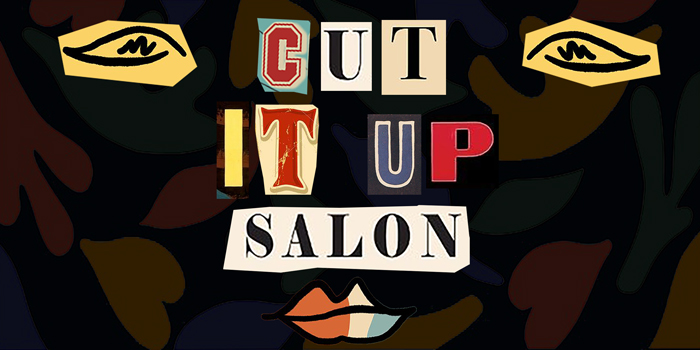
EVENING EVENT
Cut It Up Salon
Saturday, July 31, 2021 | 7:30 to 10PM
After dinner, we will meet back in The Arc Theatre for an evening of collage stories, show-and-tell, and animations. Daniel Lynds will serve as Grand Impresario for the evening and show his super cut videos. Renée Reizman will perform a reading of the Found Poetry made during the event. Clive Knights will read a short story about the deep human yearning to embrace horizons. We will present the large, collaborative collage, I Was Here Until I Wasn’t. slimebubble relies on a synesthetic sense in order to match live visuals to how they perceive the sound at an event “feels” and/or “looks”. The video-jockey will share remixed video works “heavily informed by the layering of imagery from an eidetic memory into a sequence oozing with a signature flair that contrasts bubblegum palettes with beautiful, yet wicked, images.” One lucky recipient will be awarded the chance to crush the Golden Egg. Maybe a Kolaj LIVE Milwaukee attendee will want to read a poem or tell a story or perform an interpretive dance tentatively titled, Dali’s Cheesehead in Paris. (Sign-up sheet at Info Table if interested.) Or, we can watch a documentary about the Situationist International, or not, we’ll see how it goes. The doors open at 7:30. The fun starts at 7:37. Wear a hat or something. Dramatic clothing encouraged.
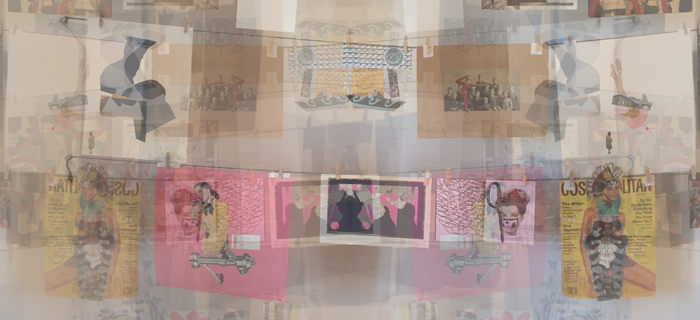
AT KOLAJ LIVE MILWAUKEE
The Great Collage Swap
Sunday, August 1st, 2021 | 9AM to 10:30AM
The Great Collage Swap is a way to get to know other collagists and their work and be able to take some of their artwork home with you. The Swap happens Sunday morning at The Arc Theatre at Saint Kate-The Arts Hotel. To participate, bring a collage to exchange to the Info Table before 9AM Sunday. In return, you will be given a number. All of the collages will be displayed in The Arc Theatre. During the program, a collage will be selected and matched with a number and the holder of that number will receive the collage.
COLLAGE PROJECTS
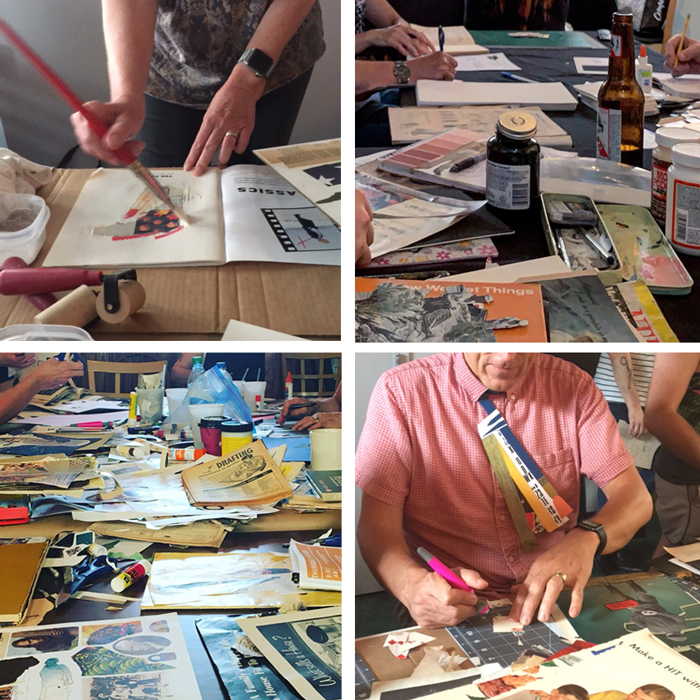
AT KOLAJ LIVE MILWAUKEE
Collage Making Marathon
Saturday, July 31, 2021 | 9AM to 10PM
Kolaj LIVE Milwaukee will host a thirteen-hour collage making marathon in The Arc Theatre. Attendees are invited to drop-in or step-out throughout the day. Because The Arc Theatre is also the site of the Symposium, artists are welcome to continue their collage making as presentations are made.
The collage making space is hosted by Ben DiNino. Collage making will take place on Saturday of Kolaj LIVE Milwaukee in the Arc Theatre. The space will have scissors, X-acto knives, glue, and a collection of papers and materials. Collagists are invited to bring their own supplies or use the supplies available.
Collage Making Space Host Ben DiNino lives in Minneapolis, Minnesota. He attended Tyler School of Art graduating with a BFA in Sculpture and a minor in Art History (and a jaded disposition of the art world). DiNino's collage appears on the cover of The International Directory of Collage Communities.
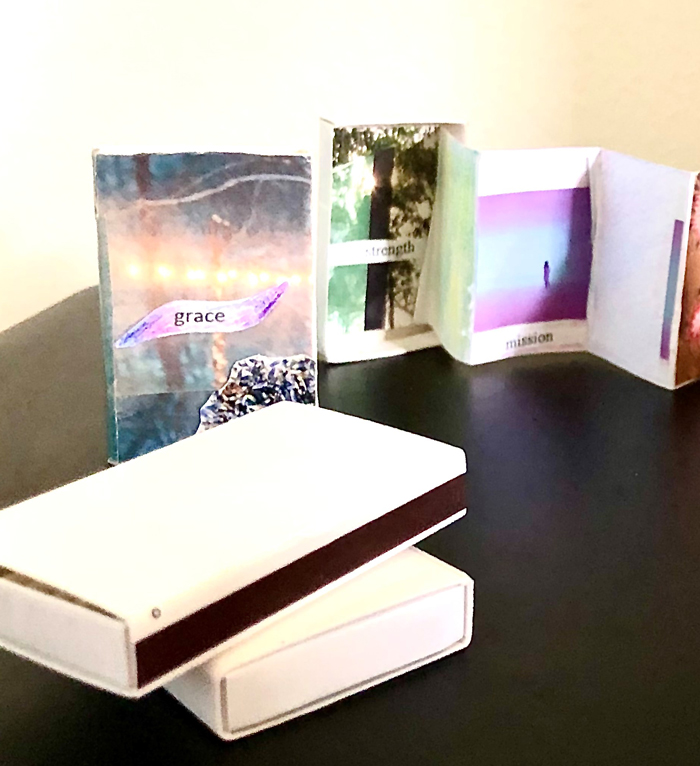
COLLAGE PROJECT
Collage a Matchbox Journal
Making collage can be good for the heart, mind, and soul. The act is a way to focus one’s mind and work through thoughts and feelings. A Matchbox Journal is a small, accordion-style art book that fits inside a matchbox that one can carry around with them. The object takes on totemic qualities and supports mindfulness. Board Certified Art Therapist Laura Fuller-Cooper will introduce this project at the Collage Congress. A blank matchbox is included in your Welcome Packet. If you have questions about the project or about the art therapy profession, Fuller-Cooper and members of the Milwaukee Art Therapy Collective and Wisconsin Art Therapy Association will be wearing purple dots on their nametags and be gathered at a table in the Collage Making Space.
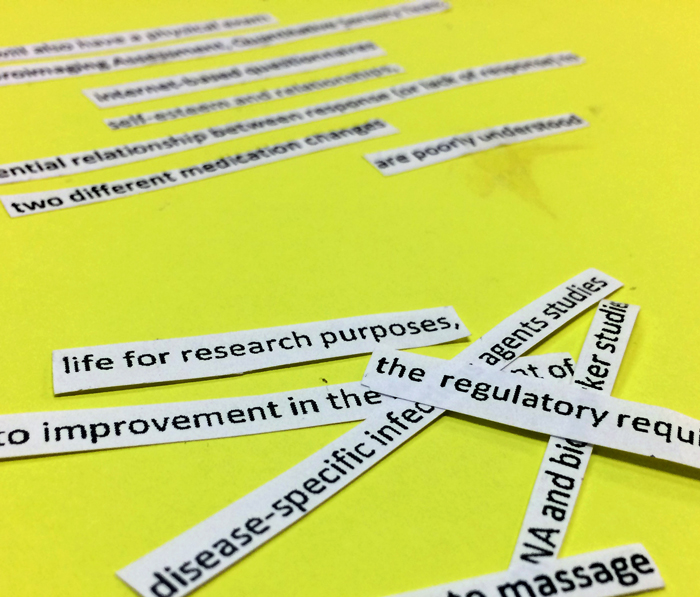
COLLAGE PROJECT
Found Poetry: Deconstructing Legalese
Renée Reizman (Los Angeles, California) is an interdisciplinary curator, artist and writer at the crossroads of social practice and creative placemaking. Working within diverse communities, she studies the ways infrastructures shape our culture, policy, and environment. At Kolaj LIVE Milwaukee, Reizman will lead a collective project that uses a collection of legal documents to create a work of Found Poetry. She explains Deconstructing Legalize as a project that “examines contracts and codes imposed upon us by bureaucratic systems, and reconstructs the language to reclaim our personal histories. The nuances of our health, relationships, advocacy, creativity and identities are often dismantled through the use of legalese: the harrows of sexual assault becomes dismissed in a non-discolure agreement, the declaration of gender identity becomes sanitized in medical records, the emotional brutality of divorce is reduced to capitalistic grievances." The found poetry work will be dramatically read at the Cut It Up Salon on Saturday evening. Reizman is the 2019-2021 Creative Catalyst, an Artist in Residence situated within the Los Angeles Department of Transportation.
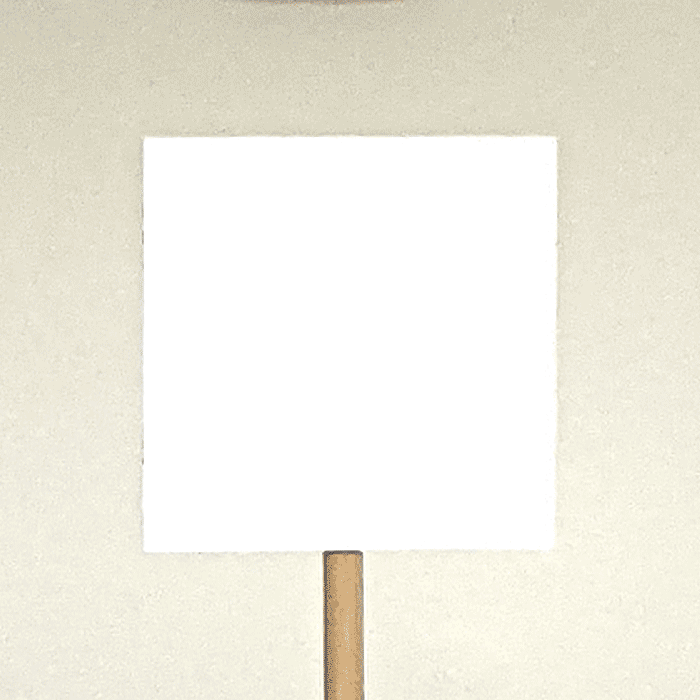
COLLAGE PROJECT
Large, Collaborative Collage:
I Was Here Until I Wasn’t
At Kolaj LIVE Milwaukee, Ellen Gradman will lead a project to create a large, collaborative collage: I Was Here Until I Wasn’t. In the Collage Making Space, participants will find a large panel on which they are invited to contribute collaged elements. We encourage people to bring a fragment that represents their home community or make one there.
Ellen Gradman’s (Chicago, Illinois) motto is “Teach Art! Create Art! Live Art!” For decades she taught art in Chicago-area schools and ran the studio, Spark Your Art. She maintains an eclectic studio practice where creates artist books, collage paintings, jewelry, and prints and works with paint, paper, beads, thread, clay, resin, and more. Her art practice often includes participatory action where the viewer is invited to leave their own mark in the artwork. “Thereby, the work changes due to the interaction between artist and viewer,” writes the artist.
SYMPOSIUM
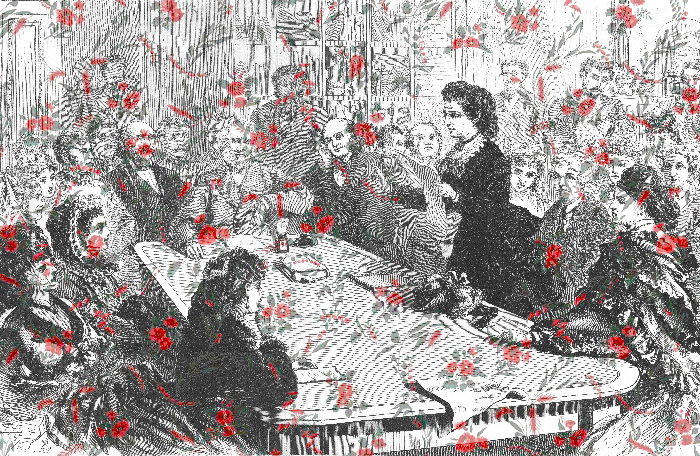
Collage Congress
Saturday, July 31, 2021 | 9:30 to 10:15AM
Kolaj Magazine Editor Ric Kasini Kadour will welcome attendees to Kolaj LIVE Milwaukee, review the schedule, and introduce a number of projects taking place during the event. We will hear from Ellen Gradman about the large, collaborative collage she is facilitating. Renée Reizman will introduce “Deconstructing Legalese,” a collaborative found poetry project that will be running during the event. Laura Fuller-Cooper, ATRL-BC, President of the Wisconsin Art Therapy Association and Founding Member of the Milwaukee Art Therapy Collective will explain the matchboxes in the Welcome Packet and speak about mental wellness and the profession of art therapy.
SYMPOSIUM
Collage in Practice
Saturday, July 31, 2021 | 10:30 to 11:45AM
In this session we will hear from four artists about their collage practice: Nathan Stromberg, Clark Lunberry, Jen Broemel, and Angela Piehl. Where do collage artist’s ideas come from? How does sourcing materials inform the artwork that is made? How have the last eighteen months shaped artist’s practices? What communities are different artists speaking to and how are they putting their art out in the world?
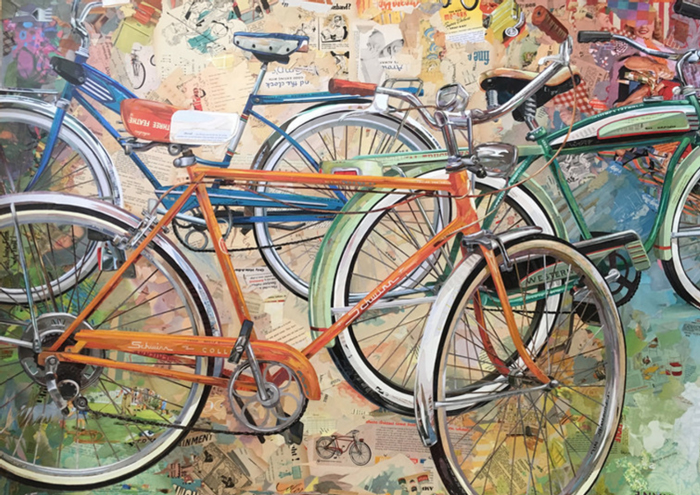
COLLAGE PRACTICE
Vintage Materials:
Joys & Pains
Nathan Stromberg (Saint Paul, Minnesota) is a collage painter, meaning he treats magazine fragments as if they are strokes of paint. Focusing on the historical space of post-war America, Stromberg renders recognizable objects from the period as two-dimensional collage. By giving these iconic objects new life he asks, “Why do we assign memory and meaning to consumer objects of metal and plastic? How is it that we experience the past through relics and what will the visual culture of the present say to those in the future?” Stromberg will speak about his approach to collage painting and how he chooses his subjects and materials. He will lead a discussion about the use of vintage period papers and the potential archival problems of fading and other preservation concerns. Stromberg holds an MFA from the Art Institute of Boston at Lesley University. His work is in the Green Bay Packers Art Collection at Lambeau Field in Green Bay, Wisconsin.
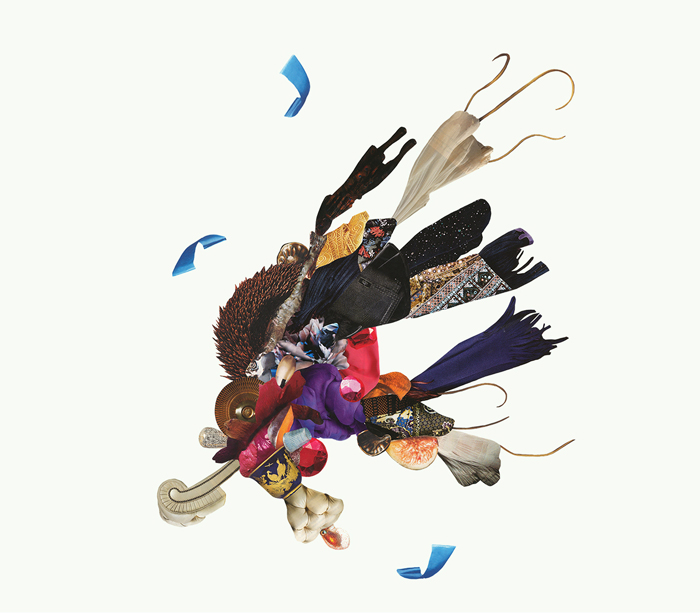
COLLAGE PRACTICE
Queer Ecology
Angela Piehl (Milwaukee, Wisconsin) makes collage that are equally dense and airy. The artist writes, “Through my work, I ask viewers to consider the relationship between accumulation and the feeling of alienation from nature, as well as question preconceived notions of nature and beauty. I quote imagery from media sources such as lifestyle magazines, which possess inherent, suggestive codifications for gender as well as seductive imagery of bourgeois lifestyle and behavior. Images I reference contain synthetic representations of nature and natural beauty, and this artifice is also layered throughout my work. The arrangements found in my compositions use style and decoration as a means of self-reflection. I incorporate a hybridization of aesthetic orders: synthetic and organic, flora and fauna, and bodily and constructed forms. Perceptions of gender are addressed in my work, as are notions of queer ecology.” Piehl will present their practice and share how collage allows them to “investigate multiple layers of meaning.” Angela Piehl is an Associate Professor and Area Head of Painting & Drawing at the University of Wisconsin-Milwaukee’s Peck School of the Arts.
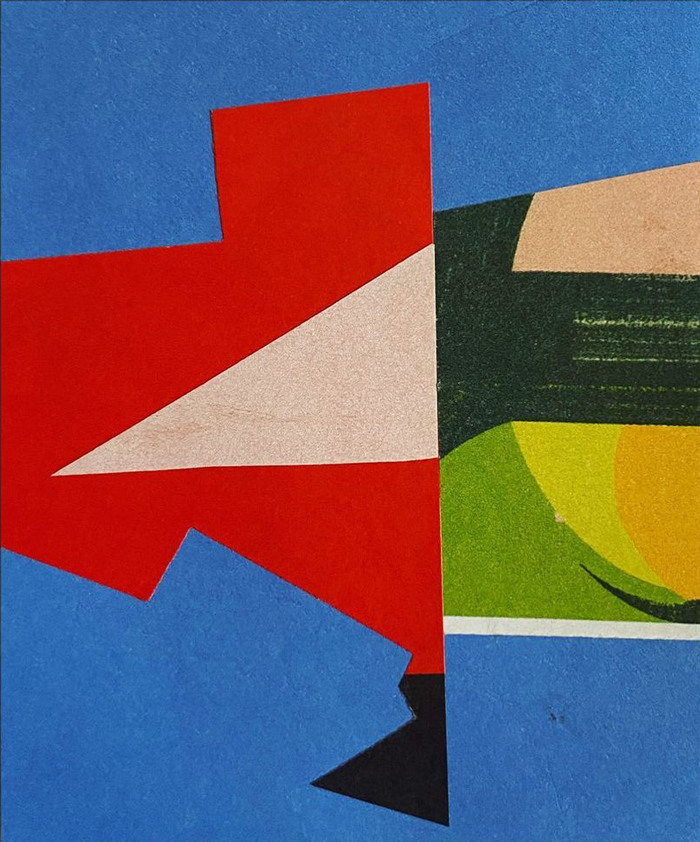
COLLAGE PRACTICE
Tiny Collage Zines
Believing that “Art makes us see heaven in this world,” Jen Broemel (Indianapolis, Indiana) makes “intuitively stitched, vibrantly colored, and geometrically abstracted paintings with cloth and thread. My intention is to inspire others to look at the world around them more carefully, more mindfully, to see the extraordinary in the discarded, to notice the beauty in the mundane. And if they can’t see it, to show them it is possible to look inward and to see things in a new and different way.” When Jen Broemel turned fifty this year, she brought this philosophy into a collage project where each day she makes a tiny collage and at the end of the week, she makes a tiny zine that she gives away. Broemel will speak about her fiber works and show us how she makes tiny collages and tiny zines and speak about how the project is her way of building a legacy while sharing with others. Broemel holds a Bachelor of Architecture and Environmental Science from Ball State University. She worked as an architect until her third child was born, when she began to focus on her studio practice.
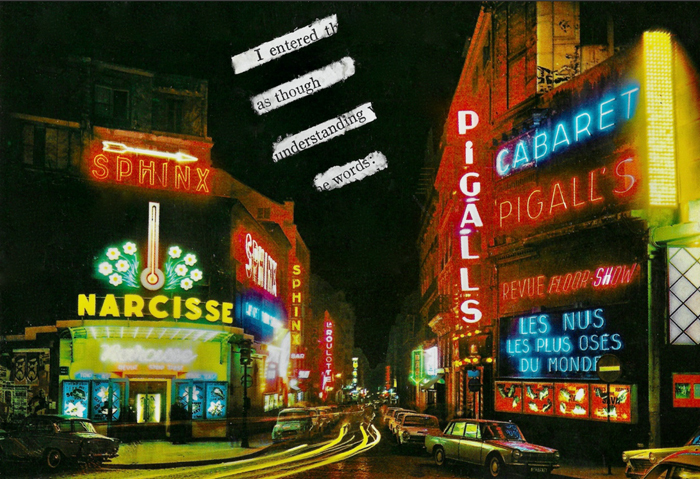
COLLAGE PRACTICE
PostCardPoems
Dale Lunberry (1927-2012) was a jeweler and watchmaker for many years in Phillipsburg, Kansas. For decades, when traveling, always with his wife, Barbara Lunberry (1929-2002), he often purchased postcards of the places they were visiting. Hundreds and hundreds of these were collected and carefully catalogued by him, no doubt intended as souvenirs, as a means of remembering the many places where they had been. On the backs of the postcards, along with the official captions identifying the locations, Lunberry would write a brief inscription of the dates of their visits. Lunberry bequeathed his collection of postcards to his son, Clark Lunberry (Jacksonville, Florida), who, during pandemic lockdowns, began adding fragments from Marcel Proust’s Remembrance of Things Past as poetically clandestine captions. The artist writes, “To my pleasure and surprise, and before I knew it, my pandemic project had taken on a life of its own, offering me even a means of imaginative travel (in time, in place), while also allowing a collaboration of sorts with my deceased dad, an engagement with Proustian remembrances from his own past, my own present, and of our own time together, and apart.” Clark Lunberry, Professor in the Department of English at the University of North Florida, is known for his large-scale, site-specific art and poetry installations on water and windows.
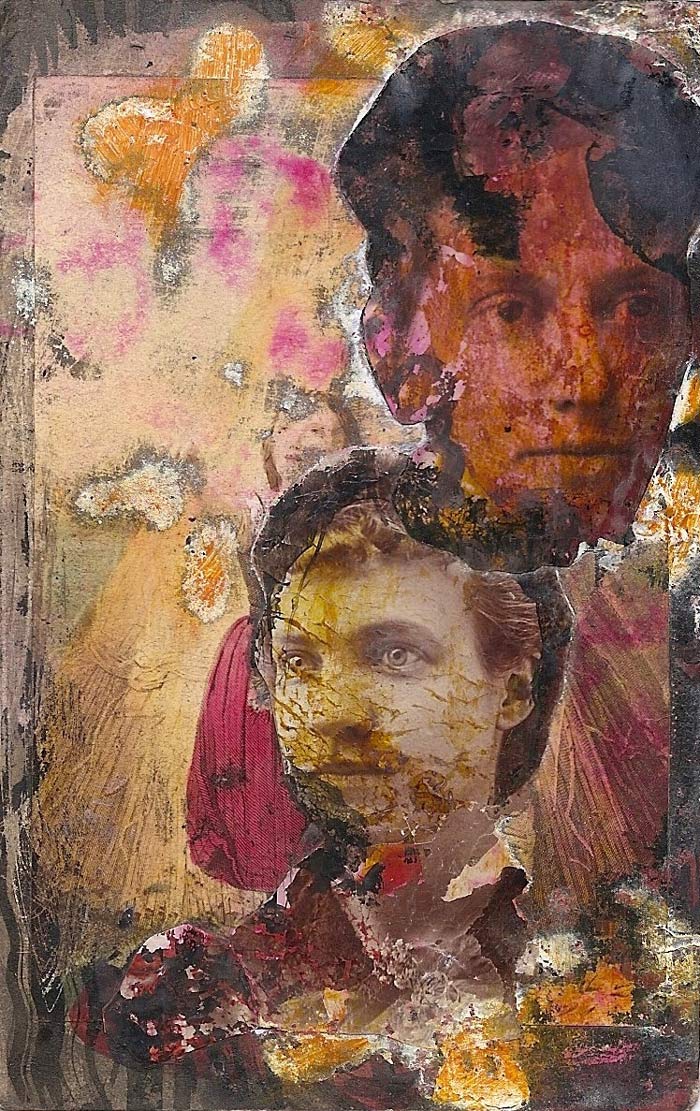
SYMPOSIUM
Collage Community: San Francisco Bay Area Collage Artists
Saturday, July 31, 2021 Noon to 12:30PM
Julie Blankenship (San Francisco, California) will take us to San Francisco’s art scene with a presentation on the Bay Area’s collage artists. Blankenship studied with Bruce Conner and Linda Connor at the San Francisco Art Institute in the mid-1980s. She taught photography, interdisciplinary art, and collaboration at the Institute and San Francisco State University.
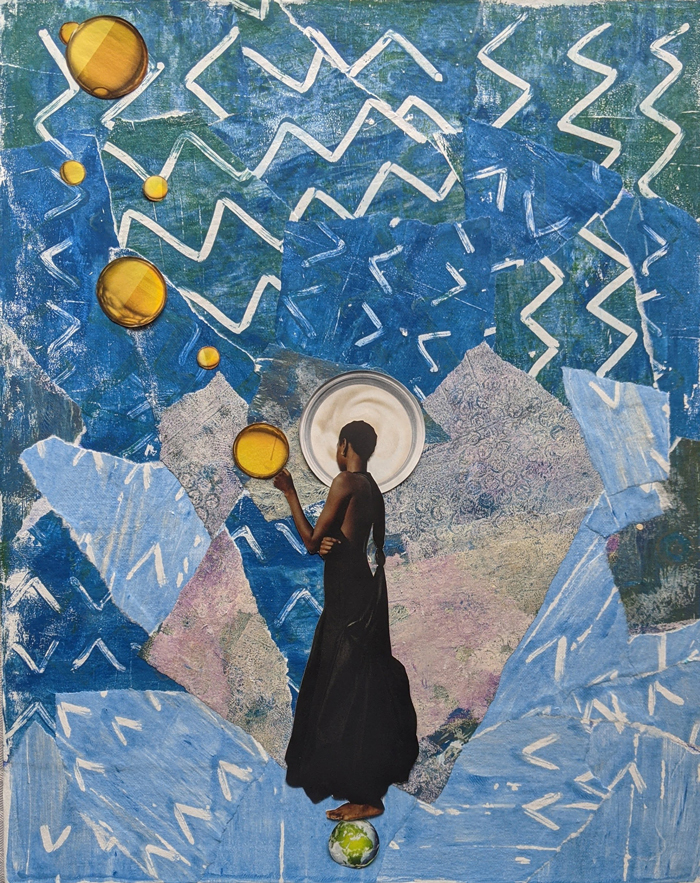
SYMPOSIUM
Decolonization in the Diaspora
Saturday, July 31, 2021 | 1:30 to 2:30PM
Adetola Abatan (Seattle, Washington) is an artist and curator interested in how artists have used collage to reframe historical narratives about Africa and the Black Diaspora. In her practice, she asks, “What does it mean to be one’s intersectional self when society—even within one’s own community—can only see one layer, one box at a time? What does it mean that symbols of faith have been used to subjugate black people (particularly, black women) in the West, and yet those same beliefs can provide resilience, fortitude, and even joy?...How can contemporary visual arts—including collage—be used to revisit historical narratives and challenge the single Eurocentric, colonial story?” As an artist, she uses “paper, fabric, scissors, and glue to express these abstract ideas in whimsical and accessible ways.” As a curator, she creates exhibitions and speaks about artwork that “build artistic bridges to the past” and leads to the “decentering of the white Eurocentric narrative to allow for multiple voices.” Abatan will speak about her work and the work of others. Adetola Abatan is transitioning from a 14-year chemical engineering career to focus on curation and exhibition, as well her own collage practice. She is currently earning an MFA in Arts Leadership at Seattle University, with plans to continue creating and curating cultural stories of African descendants in the Diaspora.
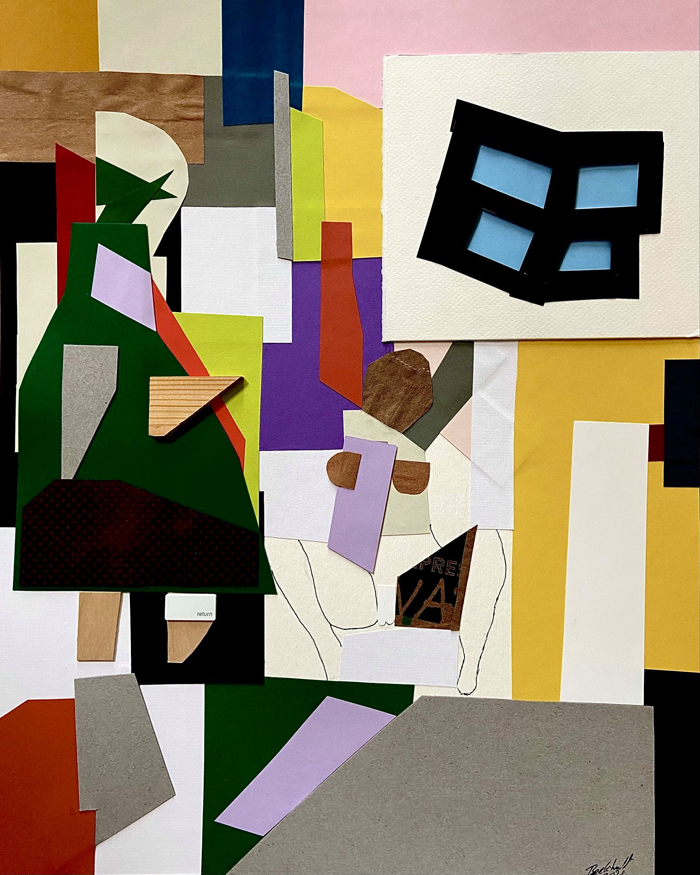
Abatan will be joined by Johannes Boekhoudt (Rockwall, Texas), a self-taught, fine art painter who also makes collage. Coming from the Dutch Antilles and Costa Rica, Boekhoudt blends influences from Europe, Africa and Latin America into his work, believing that “Between Basquiat, de Kooning, Miró & Picasso he also exists.” Over many years, Boekhoudt has developed a distinct visual language in his paintings using brush marks and crosses that carries over to his collage work. He works primarily in abstraction with figurative and other representational elements making their way into pieces. “Since the beginning, the core of his works has been his strong ideas on human rights, social justice, children’s rights, and women’s rights. He openly addresses atrocities such as child abuse, domestic violence, organ trafficking, as well as social injustice issues of political instability occurring around the world.”
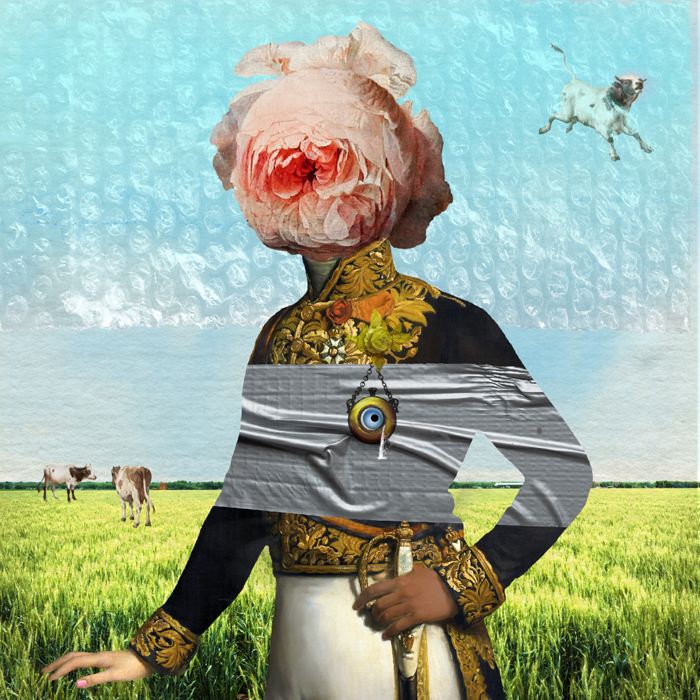
SYMPOSIUM
The Situationist International Today
Saturday, July 31, 2021
2:45 to 3:15PM
In 1957, a group of avant garde artists, political activists, and Marxist intellectuals came together as the Situationist International, a movement that sought to reshape Dada and Surrealism into a mid-20th century critique of advanced capitalism. Among other things, they used collage to make posters and brochures that critiqued consumerism and social, political, and economic ailments. Guy Debord, a founding member, wrote extensively about the group’s undertaking and published the “notoriously turgid” essay “A User’s Guide to Detournement” in 1956 and the slightly more legible “The Society of the Spectacle” in 1967. In these essays is a social critique and a number of strategies that continue to inform collage practice today. Artist and scholar Ashley Pryor Geiger (Toledo, Ohio), Ph.D. Philosophy from The Pennsylvania State University, will draw on her extensive research and her own art practice to unpack these ideas into four practical tips for today’s collage artists.
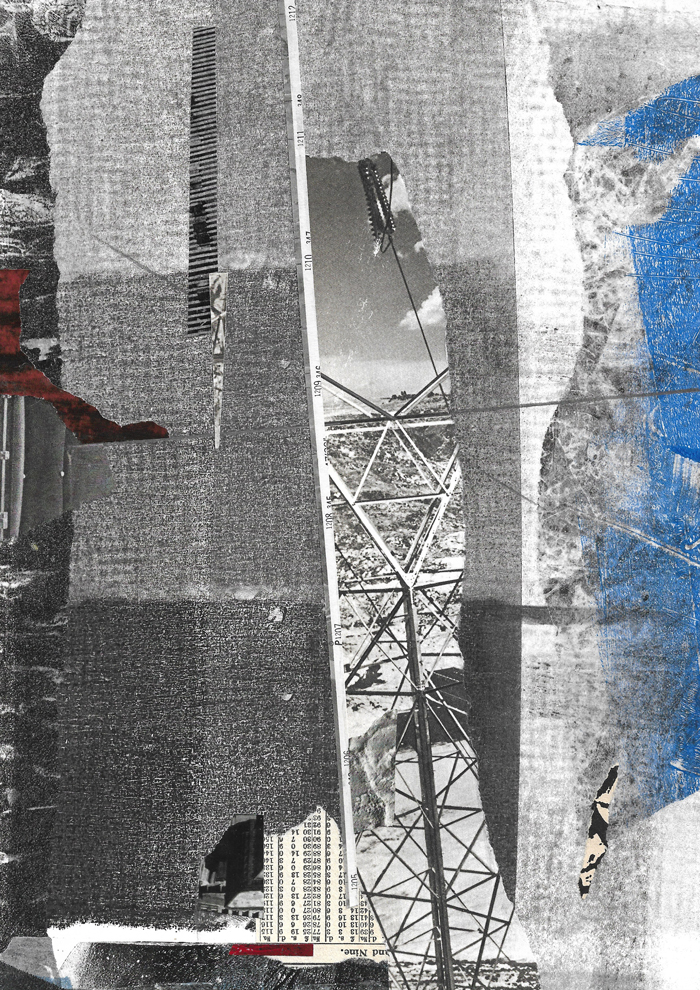
SYMPOSIUM
Collage as Bridge Between Psyche & Cosmos
Saturday, July 31, 2021
3:15 to 3:45PM
Illustrated with handmade and digital collages created by graduate architecture students, Clive Knights (Portland, Oregon) will reveal the efficacy of handmade collage work as progenitor in exploring the cultivation of human community in a context of natural cycles. Addressing themes of human necessity such as feeding, sleeping, washing and congregating, one project challenges the commodified, introspective spatial realities of the contemporary home by effectively turning it inside out to respond to its broader context. The second project addresses mental health in the houseless population and deploys collage to consider places of communal experience in the city amidst the fragmented reality of human psychic diversity. Knights practices both art and architecture, in particular mixed media collage, monotype printmaking and the design and installation of unique festival structures in collaboration with colleagues and students from Portland State University School of Architecture, where he is a professor. He holds professional arts and architectural design degrees from Portsmouth Polytechnic in Hampshire, England and a Master of Philosophy from Cambridge University.
SYMPOSIUM
Hybrid is the Future: Digital to Analog to Digital to Analog
Saturday, July 31, 2021 | 4:00 to 5:30PM
Some collage artists hold to a strict analog practice while others only work with a computer. The analog and digital divide elicits strong feelings in each camp. However, a third camp is becoming increasingly visible in this debate: Those who do both. In this session analog and digital collage practice is explored from a variety of perspectives. Speakers are David Wischer, A. Morgan McKendry, Brian Pirman, and Ron Buffington.
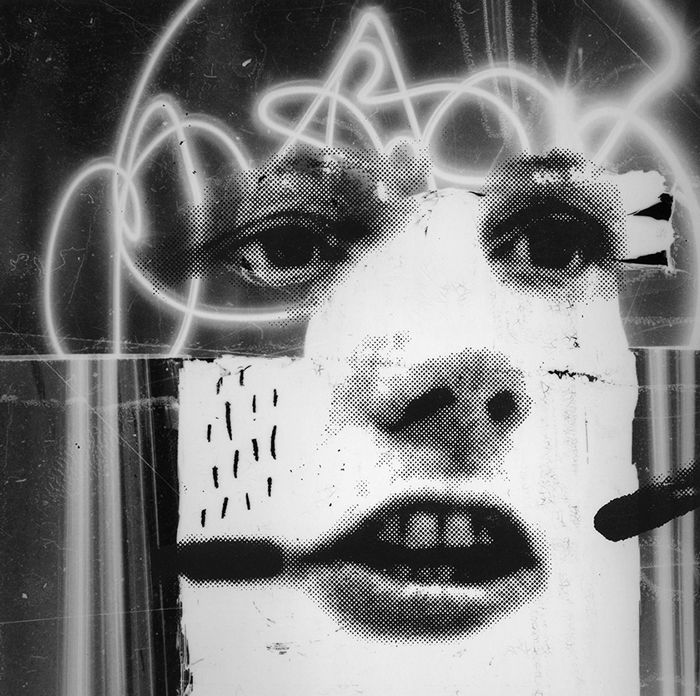
HYBRID IS THE FUTURE
Observations of The Absurd
David Wischer (Lexington, Kentucky) incorporates both digital and analog collage into his printmaking and print media work. “My work is heavily influenced by my personal daily observations of The Absurd. Social media, the internet, television, current events, and technology are a constant source of inspiration for me. Through my use of collage, printmaking, and photography, I meld topical humor, social commentary, nostalgia, and parody in my work, which functions as an inside joke for a generation of adults who grew up absorbing their knowledge through television and the internet,” writes the artist. “Much of my artwork is built around appropriated images which may be familiar to the viewer. This recognition becomes the set-up to my visual punch line.” Wischer will speak about his work with 35mm collage and printmaking and the use of appropriation, pop culture, and portraiture to speak to the viewer.
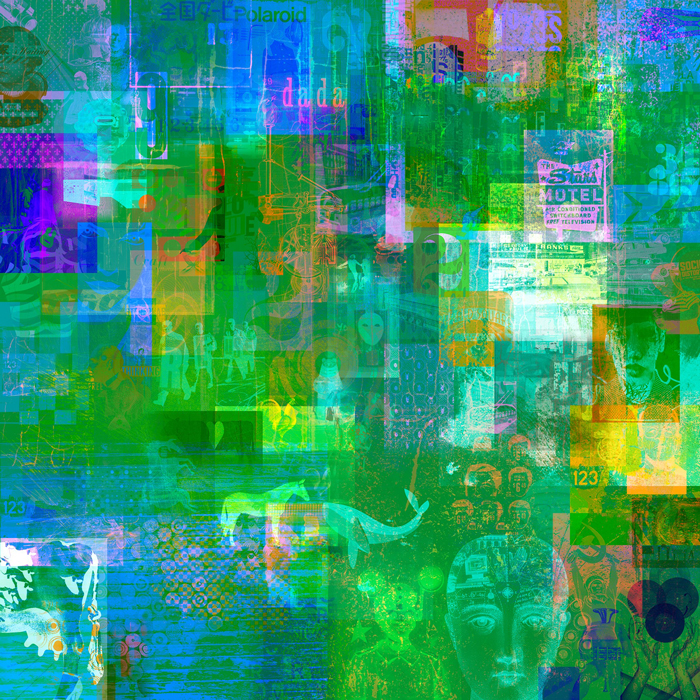
HYBRID IS THE FUTURE
Color, Form, Texture & Patterns
Drawing from fine art, film, nature and popular culture, Brian Pirman (De Pere, Wisconsin) experiments with collage and digital imaging with a focus on color, form, texture and patterns. His primary goal is creating engaging and thought-provoking work. His “Alphabet Collage” series renders the complete alphabet (including ampersand and question mark) using animal imagery, vintage engravings, and letterforms. His “X” series renders one hundred versions of the eponymous letter using as many design strategies. His series, “Corona”, presents colorful visual patterns that reflect on the COVID-19 Pandemic. His practice moves back and forth between digital and analog. Pirman will speak about the evolution of his process and how he develops a project. Pirman has been designing professionally since the 1980s and has been teaching art and graphic design at St. Norbert College in De Pere, Wisconsin since 1997.
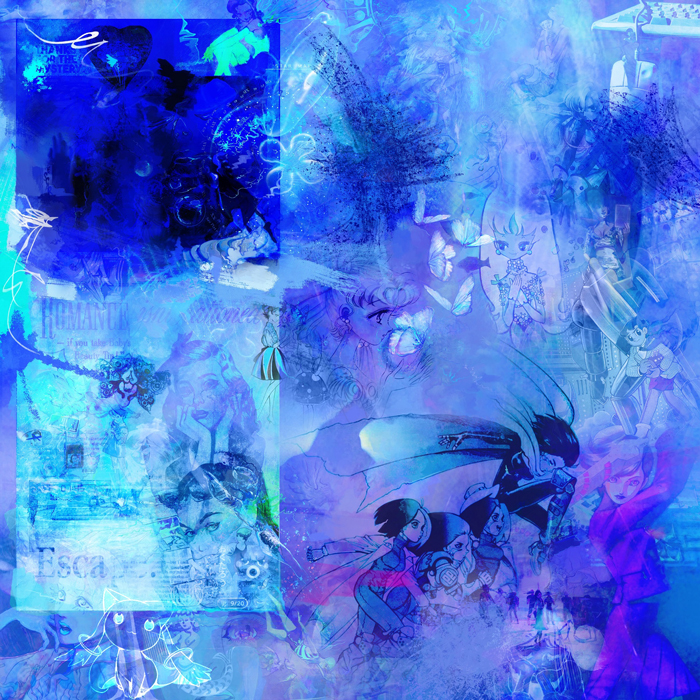
HYBRID IS THE FUTURE
Abstract Digital Assemblages
A. Morgan McKendry (Brooklyn, New York) works primarily as a digital artist creating video and abstract collages they refer to as digital assemblages. They source from various obsessions including cartoons, film, anime, video games, memes, to that of famed art historical works and critical theory. Much of their work is seeded in re-appropriating visuals to create a different narrative outside of power hierarchies; mining a background of art history imbued in visual and cultural theory. They are keenly interested in the implications of technology on perception, experience, and artistic medium; working between multiple programs, screens, and files—layering to at once address the latent meanings within the visuals, whether still or moving, sampled while weaving an abstracted realm free of such earthly confines of gravity, falling past the expectations of reality. McKendry will speak about digital collage paintings and what they call digital assemblage.
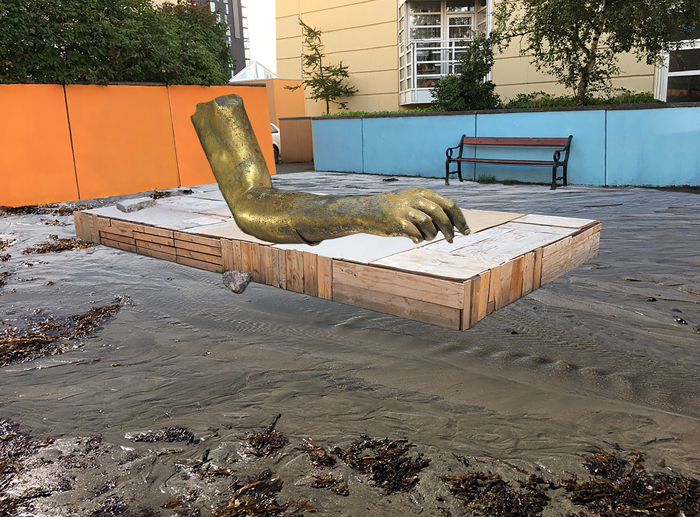
HYBRID IS THE FUTURE
Collage as an Operation
Ron Buffington (Signal Mountain, Tennessee) builds “sculptural constructions comprised of found materials—floats detached from fishing nets, shards of burnished plastic, lost or abandoned toys, rough-hewn chunks of Styrofoam.” He writes, “I combine these materials in a manner reminiscent of collage, attaching or conjoining them, arranging them side-by-side on shelves, stacking them precariously on platforms...I choose to leave them intact, to present them, simply, to honor them—as things.” At the University of Tennessee, Buffington teaches the course, “Collage as an Operation”, during which he familiarizes students with the rich history of collage. Taking an expansive approach, students experiment with digital collage, assemblage, the book form, and the course culminates in an individual project of the students’ conceptions. Buffington will share his ideas about how collage is rooted in the act of cutting and pasting and present a slideshow of his work with assemblage and digital collage.
BONUS PROGRAMS
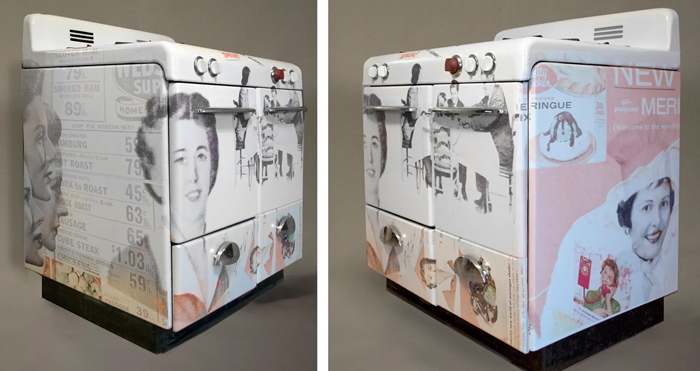
BONUS PROGRAM
Digital Decals: Collage on 3D Objects
Sunday, August 1st, 2021| Noon to 2PM
Note: Space is limited. RSVP required. The material cost of this workshop is $20. To sign-up, send an email or speak to someone at the Kolaj LIVE Milwaukee Information Desk. First come, first serve and we will create a waiting list if all the spaces are filled. Requirements: Participants must bring their own laptop with Photoshop installed and ready to use. One can try Adobe for free for a limited time here.
Evelyn Davis-Walker (Hahira, Georgia) makes striking three-dimensional objects where she applies collage to everyday objects like milk bottles, ovens, and clothing irons. Her work uses the language of advertising copy to manipulate social messages that once bombarded women. By bringing this work into the third dimension, she is able to create an experience of collage that engages the viewer in a deeper way. Davis-Walker brings “excitement, enthusiasm, and knowledge in alternative techniques of collage, specifically as it relates to culture jamming and the reexamining of women’s roles in our society.”
Davis-Walker will teach others her Digital Decals technique. Working on their own laptops, participants will learn how to prepare files and achieve a variety of transparency outcomes through the use of five basic Photoshop tools. Participants will then print decal transfers and Davis-Walker will lead them through the application of the decals onto a blank white tin. Participants will end the workshop prepared to use this technique in their own art practice and with a collaged object to take home.
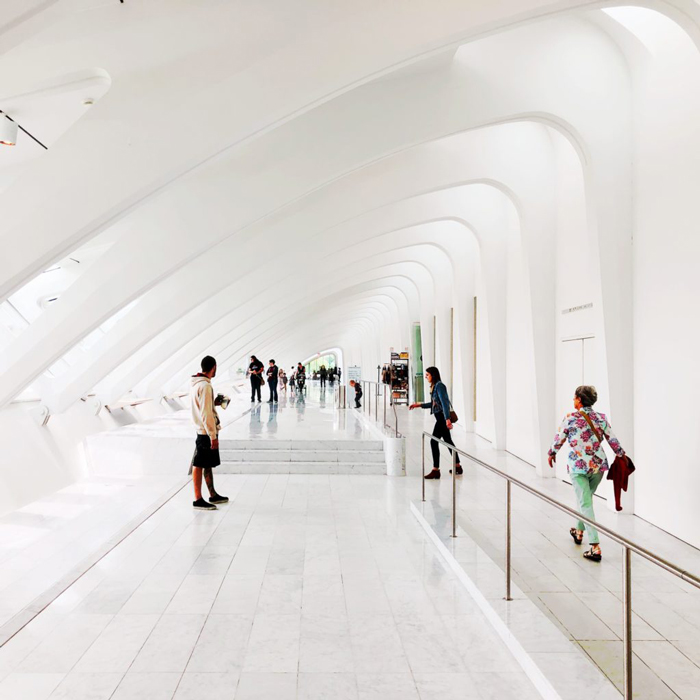
BONUS PROGRAM
Collage Scavenger Hunt at Milwaukee Art Museum
Sunday, August 1st, 2021 | Noon to 3PM
NOTE: Tickets must be purchased in advance by visiting the museum's website. Adult admission is $19. Milwaukee Art Museum members and members with reciprocal membership through NARM or ROAM may simply show their membership card upon entry.
On Sunday afternoon, those who wish to spend a little more time in Milwaukee are invited to join us at the Milwaukee Art Museum at Noon for a Collage Scavenger Hunt. With a history dating back to 1888, the Milwaukee Art Museum’s Collection includes over 31,000 works from antiquity to the present, encompassing painting, drawing, sculpture, decorative arts, prints, video art and installations, and textiles. The collection is an opportunity to look at how collage informs other media. The strong representation of folk and Haitian art in the collection invites us to imagine a different sort of art history canon than the one we are taught in school. For example, City Scene by Ralph Fasanella (American, 1914–1997) is an oil painting on canvas, but the liberties the artist takes with respect to scale and the use of colorful patterns in the windows reflect collage-thinking. This observation is confirmed by a remark made by his son, Marc Fasanella. Ralph “had an incredibly active mind, incessantly absorbing new information and forming a theoretical and visual collage of ideas from the events of his daily life.”
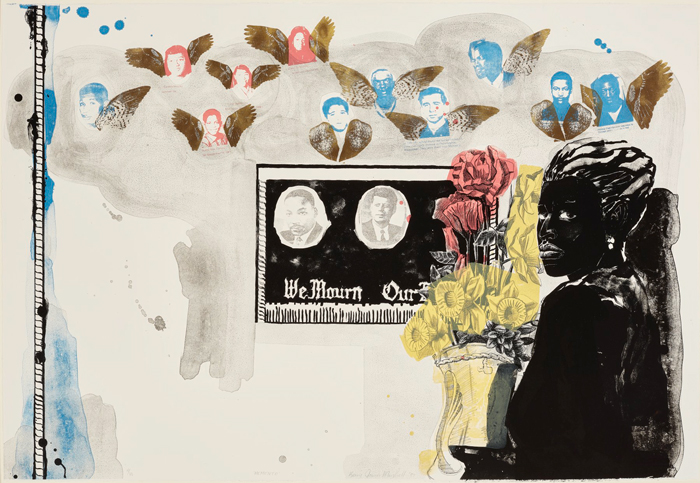
Other exhibits we will explore include “American Memory: Commemoration, Nostalgia, and Revision”. The museum writes, “The narratives about the history of our young nation are often told from a single perspective. The experiences of women, people of color, and LGBTQI+ individuals (to use the current term) were rarely considered in the course of documenting historical events, and the incidents that impacted them most were frequently ignored, skewed, or outright erased. ‘American Memory: Commemoration, Nostalgia, and Revision’ exposes this selective editing of history as it seeks to relate the true price of pursuing the American dream. The exhibition is divided into three chapters, two of which will be on view: ‘People and Identity’ explores the nature of portraiture. ‘Activism and Terrorism’ studies the normalization of racist, violent imagery. Drawing from prints, drawings, paintings, and photographs from the nineteenth and twentieth centuries and contemporary times, the exhibition reveals a complicated view of past events. The exhibition is an opportunity to see how artists are using collage and the past to inform our present.”
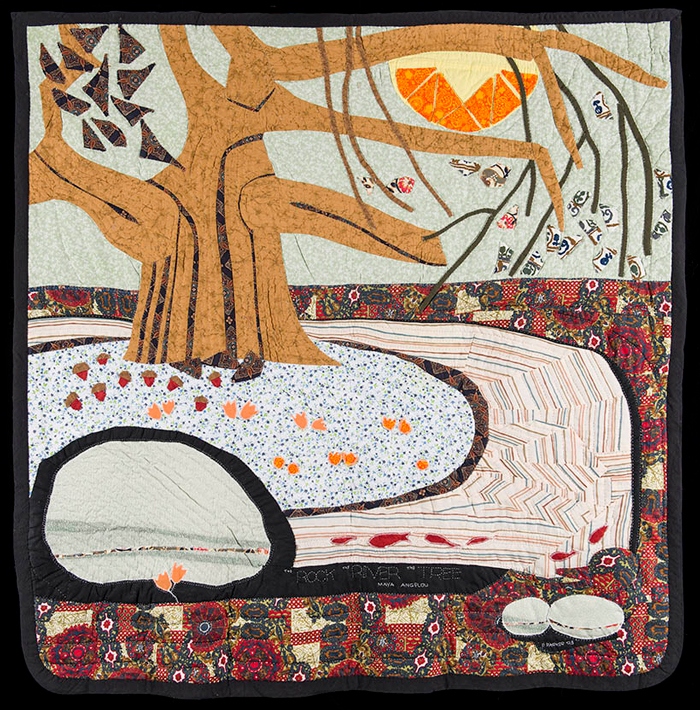
We will also look at the intersection of craft and collage in “The Quilts of Pauline Parker”. The exhibition features more than thirty objects that showcase Parker’s expressive approach to quiltmaking, illustrating how the artist transformed a traditionally domestic craft into one that highlighted current events, historical and biblical figures, and her own travels and experiences. Parker studied painting at the School of the Art Institute of Chicago, but her work in fabric began in Wisconsin, where she moved upon retirement. She initially worked with traditional patterns and used techniques she had learned from her mother and aunts, before expanding her subject matter, stitching more freely, and exploring a less traditional approach to quiltmaking. The narrative quilts, or “fabric collages” as Parker termed them, featured in the exhibition were all made between the late 1980s and early 2000s.
Because of restrictions designed to keep us safe during the COVID-19 pandemic, we will explore the museum in small groups to permit appropriate social distancing. Artists will be given a list of collage-relevant works to seek out as they explore the museum. At 2:30PM, we will meet at East End (near the museum’s Lakefront entrance) for a discussion of what we found and how these works inform our understanding of collage.
Supporters
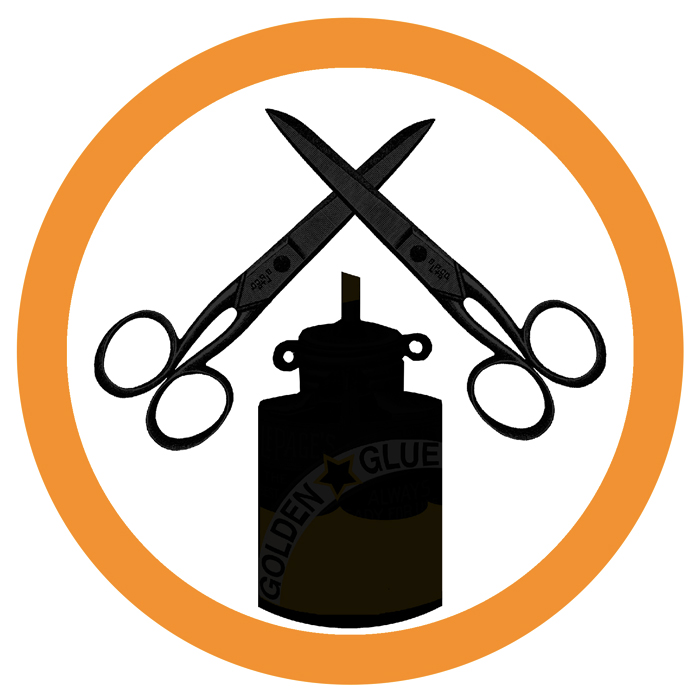
Kolaj LIVE Online is possible through the support of members of the Silver Scissors & Golden Glue Societies whose monthly pledge sustains the organization. JOIN TODAY!
